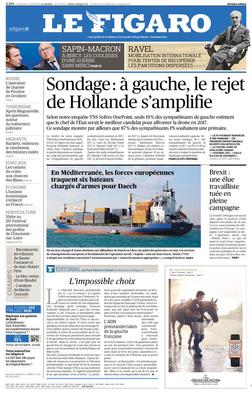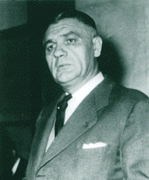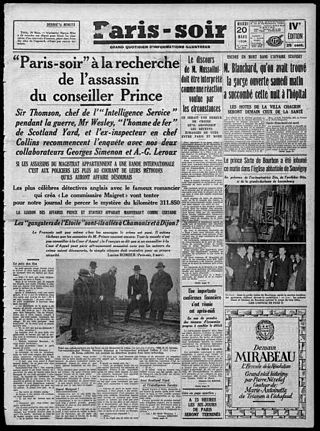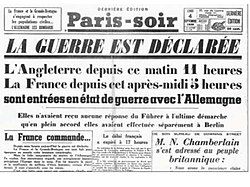
Le Figaro is a French daily morning newspaper founded in 1826. It was named after Figaro, a character in a play by polymath Beaumarchais (1732–1799); one of his lines became the paper's motto: "Without the freedom to criticise, there is no flattering praise".

L'Équipe is a French nationwide daily newspaper devoted to sport, owned by Éditions Philippe Amaury. The paper is noted for coverage of association football, rugby, motorsport, and cycling. Its predecessor, L'Auto, was a general sports paper that also covered auto racing which was gaining popularity at the turn of the twentieth century.
Robert Hersant was a French newspaper magnate. He was a leader in the pro-Nazi youth movement during the Vichy wartime years, but after prison time built a major newspaper empire and engaged in conservative politics. At the time of his death he operated 40 publications and employed 8,000 people, but failed in his leap into television.

The National Front for an Independent France, better known simply as National Front was a World War II French Resistance movement created to unite all of the resistance organizations together to fight the Nazi occupation forces and Vichy France under Marshall Pétain.

Le Soir is a French-language quality Belgian daily newspaper. Founded in 1887 by Émile Rossel, it was intended as a politically independent source of news. Together with La Libre Belgique, it is one of the country's most popular Francophone newspapers in both Brussels and Wallonia, and since 2005 has been published in Berliner format. It is owned by Rossel & Cie, which also owns several Belgian news outlets, as well as the French paper La Voix du Nord.
France Soir was a French newspaper that prospered in physical format during the 1950s and 1960s, reaching a circulation of 1.5 million in the 1950s. It declined rapidly under various owners and was relaunched as a populist tabloid in 2006. However, the company went bankrupt on 23 July 2012, before re-emerging as an online-only media in 2016. In 2020, according to NewsGuard, this media "fails to adhere to several basic journalistic standards".

The Francist Movement was a French fascist and anti-semitic league created by Marcel Bucard in September 1933 that edited the newspaper Le Francisme. Mouvement franciste reached a membership of 10,000 and was financed by the Italian dictator, Benito Mussolini. Its members were deemed the francistes or Chemises bleues (Blueshirts) and gave the Roman salute.

La Voix du Nord is a regional daily newspaper from the north of France. Its headquarters are in Lille.

La Libre Belgique, currently sold under the name La Libre, is a French-language quality Belgian daily newspaper. Together with Le Soir, it is one of the country's most popular Francophone newspapers in both Brussels and Wallonia. La Libre was founded in 1884 and has historically had a centre-right Christian Democratic political stance. The papers is particularly celebrated for its role as an underground newspaper during World War I and World War II when Belgium was occupied. Since 1999, the newspaper has become increasingly liberal but is still considered more conservative than Le Soir.

L'Est Républicain is a daily regional French newspaper based in Nancy, France.
Raymond De Becker (1912–1969) was a Belgian journalist, writer, and intellectual. He became closely involved in Catholic and anti-parliamentarian politics in the interwar years and is notable as the editor of the daily newspaper Le Soir and a leading exponent of "intellectual collaboration" in German-occupied Belgium during World War II.

L'Aurore was a French newspaper first sold on 11 September 1944, soon after the Liberation of Paris. Its name refers to the previous, unrelated publication, L'Aurore (1897–1914). Publication ended in 1985.

The "Faux Soir" was a spoof issue of the newspaper Le Soir published in German-occupied Belgium on 9 November 1943. It was produced by the Front de l'Indépendance, a faction in the Belgian Resistance, in a satirical style that ridiculed German propaganda. Though it resulted in significant repression, the Faux Soir's embodiment of zwanze, the characteristic folk humour of Brussels, made it an enduring symbol of the Resistance. The incident was the centerpiece for the 1954 film, Un Soir de Joie.

Émilien Amaury was a French publishing magnate whose company now organises the Tour de France. He worked with Philippe Pétain, head of the French government in Vichy France during the Second World War, but used his position to find paper and other materials for the French Resistance. His links with Jacques Goddet, the organiser of the Tour de France, led to a publishing empire that included the daily sports paper, L'Équipe. Amaury died after falling from his horse; his will led to six years of legal debate.

Various kinds of clandestine media emerged under German occupation during World War II. By 1942, Nazi Germany occupied much of continental Europe. The widespread German occupation saw the fall of public media systems in France, Belgium, Poland, Norway, Czechoslovakia, Northern Greece, and the Netherlands. All press systems were put under the ultimate control of Joseph Goebbels, the German Minister of Propaganda.

Jean Prouvost was a businessman, media owner and French politician. Prouvost was best known for building and owning the publications that became France-Soir, Paris Match, and Télé 7 Jours.

Paris started mobilizing for war in September 1939, when Nazi Germany and the Soviet Union attacked Poland, but the war seemed far away until 10 May 1940, when the Germans attacked France and quickly defeated the French army. The French government departed Paris on 10 June, and the Germans occupied the city on 14 June. During the occupation, the French government moved to Vichy, and Paris was governed by the German military and by French officials approved by the Germans. For Parisians, the occupation was a series of frustrations, shortages and humiliations. A curfew was in effect from nine in the evening until five in the morning; at night, the city went dark. Rationing of food, tobacco, coal and clothing was imposed from September 1940. Every year the supplies grew more scarce and the prices higher. A million Parisians left the city for the provinces, where there was more food and fewer Germans. The French press and radio contained only German propaganda.

The clandestine press of the French Resistance was collectively responsible for printing flyers, broadsheets, newspapers, and even books in secret in France during the German occupation of France in the Second World War. The secret press was used to disseminate the ideas of the French Resistance in cooperation with the Free French, and played an important role in the liberation of France and in the history of French journalism, particularly during the 1944 Freedom of the Press Ordinances.
Pierre Lazareff (1907–1972) was a French newspaper editor and publisher.















